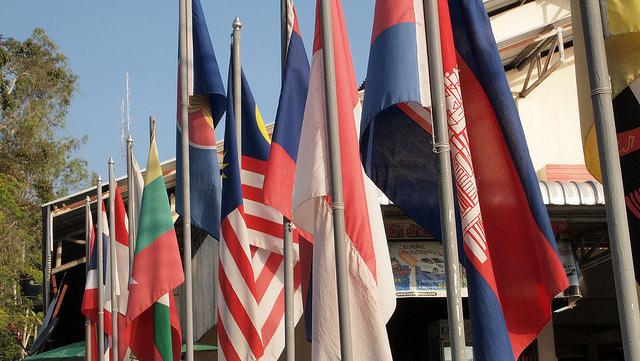In defence of distance: why Australia should stay out of ASEAN
Posted By Mathew Davies on October 8, 2015 @ 06:00
In a thought-provoking piece [2], Graeme Dobell outlines not only why he thinks Australia should join ASEAN but also, more daringly, why it will join ASEAN. The argument raises important questions of Australia’s relationship with Southeast Asia, and I have serious doubts that the price of joining ASEAN is one that Australia would or should pay. While Dobell rightfully notes that such a move would require considerable change of heart in both Canberra and in capitals across Southeast Asia, I think its scale would be so dramatic and all-encompassing as to be beyond the realms of political and social feasibility.
To take the desirability question first, it isn’t in Australia’s interest to join ASEAN. And while Dobell rightly outlines the difficulties Australia would face in joining ASEAN he hasn’t fully considered the costs of doing so.
Accession would require agreement to, and then participation in, the full range of ASEAN’s extant institutions, declarations and commitments. As a member, Australia would necessarily be bound by the same rules and norms as all other members—most problematically the commitments to sovereign equality, non-intervention and the freedom of domestic affairs from regional criticism. This goes far beyond the usual commitments to sovereignty that membership of the UN suggests; instead it’s a pre-emptive blanket that smothers the possibility of criticism from other member states.
Australia joining ASEAN would have numerous deleterious consequences for the promotion of our values. What is the benefit of Australia being willingly mute in the realm of human rights and democracy? How would this assist either the realisation of our interests or those help those living in ASEAN’s less liberal, more authoritarian, members? Why should Australia be content to sit on the ASEAN Intergovernmental Commission on Human Rights when that body’s freedom of action is so tightly curtailed by non-intervention? Not only does this seem highly unlikely but it also would be accompanied by huge political costs in the eyes of Australians. Australia should seek to play a more constructive, more critical and more valuable role on the outside than it ever could on the inside, unconstrained by the muffling effect that comes with being on the inside of ASEAN.
The argument as to why Australia will not, and should not, join ASEAN is underscored by these comments [3] from former Indonesian ambassador to Australia, Sabam Siagian, writing with Endy Bayuni in The Jakarta Post:
‘Politically, Australia is still stuck in 20th century mode. It is a monarchy with a head of state in London, and all its security arrangements are Cold War relics, whereby they take orders from Washington. Australia is out of sync with the emerging geopolitical environment of Asia today. Until Australia fixes this anomaly and moves into the 21st century, it is hard for Indonesia and the rest of Asia to take Australia more seriously.’
Those comments hit two key points. First, ASEAN was in part created to keep countries like Australia out of regional affairs, not to be a vehicle for their potential inclusion—Southeast Asia for Southeast Asians. This post-colonial mind-set remains prevalent today, and while members may disagree on a huge range of issues, they remain in fierce agreement that they alone get to delineate what ASEAN is for. Notwithstanding the deep and enduring transregional alliances that many members of ASEAN maintain, the project of regional resilience was intended to be a statement about indigenous self-help as a vehicle for both mutual respect and self-respect.
Second, arguing the inevitability of Australia’s membership of ASEAN pre-supposes that Southeast Asia would even want Australia to accede. Realism suggests this is so unlikely as to be in the realm of fantasy. Australia is viewed as fundamentally not of the region—tied by history and choice to the very centres of power that ASEAN was in part constructed to hold at arm’s length. Any Australia-led effort to promote the renegotiation of membership obligations to accommodate Australia’s membership would be seen as evidence of this difference and strengthen the hand of those who would want to see Australia excluded.
Australia’s relationship with Southeast Asia is clearly of great importance, but the solution isn’t as simple as the binary ‘in or out of ASEAN’ choice suggests. Australia must manage its regional and extra regional interests in a way that pays heed to the fact that Australia neither presents itself as Southeast Asian nor is perceived as such in the region. This isn’t an insurmountable obstacle to more effective, more meaningful and more substantive cooperation between Australia and its northern neighbours—and much more can and should be done in this field—but it’s a call for realism. The future of Australia’s relations with members of ASEAN is too important to be jeopardised by confusing the clear need for closer relations with a desire for membership.
Article printed from The Strategist: https://aspistrategist.ru
URL to article: /in-defence-of-distance-why-australia-should-stay-out-of-asean/
URLs in this post:
[1] Image: https://aspistrategist.ru/wp-content/uploads/2015/10/8662766017_9862342d10_z.jpg
[2] thought-provoking piece: https://aspistrategist.ru/why-australia-should-join-asean/
[3] these comments: http://www.thejakartapost.com/news/2015/08/10/australia-needs-figure-out-its-own-place-asia.html
Click here to print.
